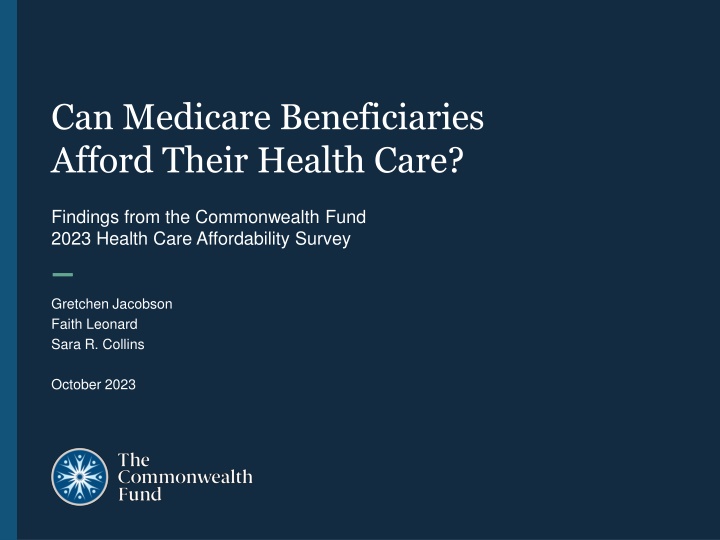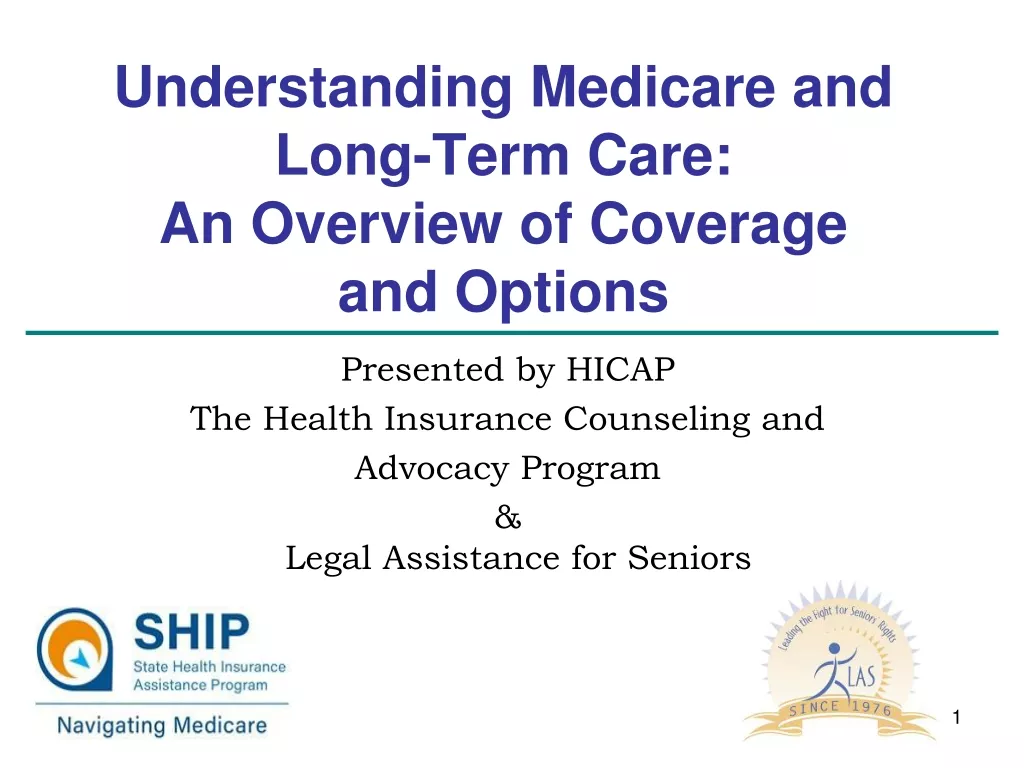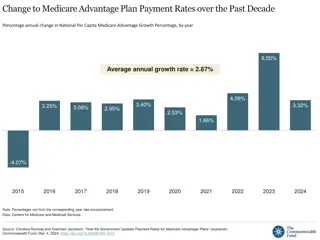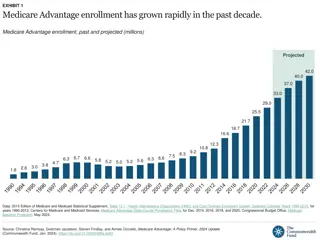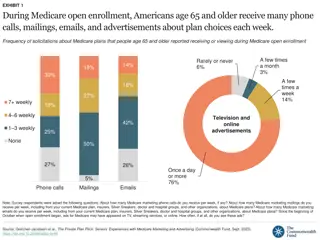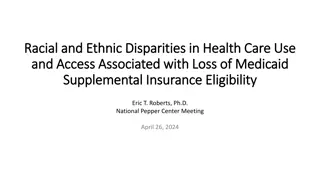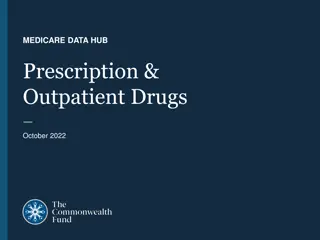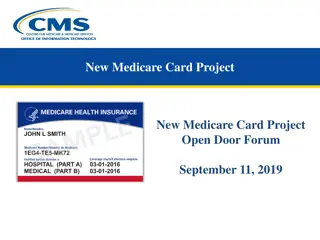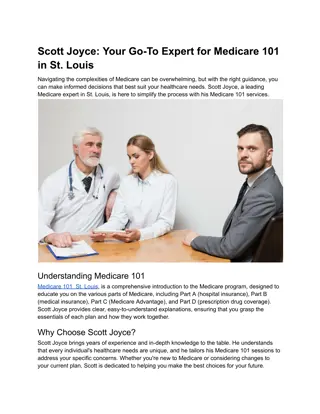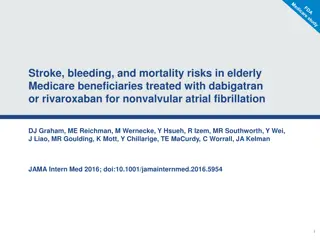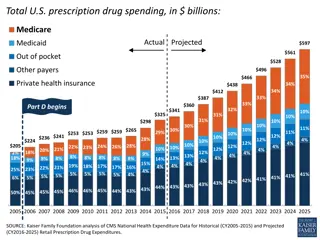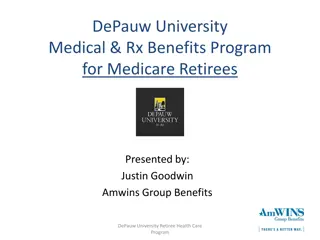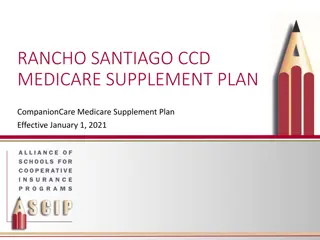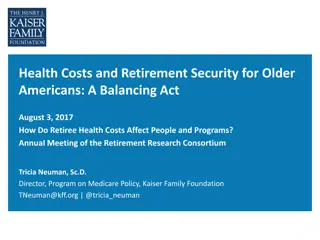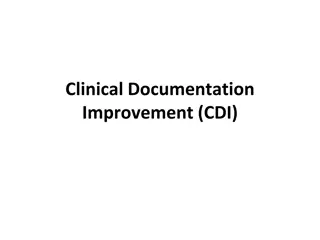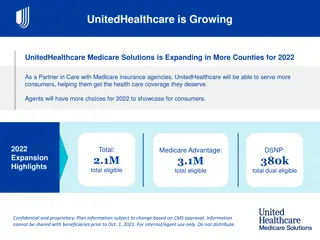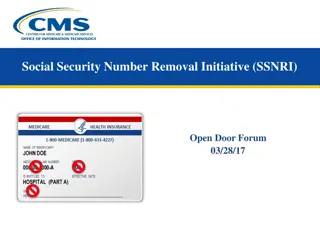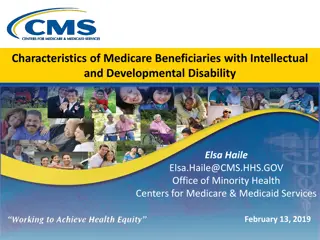Can Medicare Beneficiaries Afford Their Health Care? Findings from Commonwealth Fund 2023
Americans with Medicare face challenges affording health care, with many struggling to pay for essential health services. The Commonwealth Fund 2023 survey reveals that a significant portion of Medicare beneficiaries find it difficult to afford health care costs, leading to delays in necessary care and impacting their ability to cover basic living expenses like food and utilities. The study highlights the financial pressures faced by Medicare recipients, especially those under the age of 65.
Download Presentation

Please find below an Image/Link to download the presentation.
The content on the website is provided AS IS for your information and personal use only. It may not be sold, licensed, or shared on other websites without obtaining consent from the author.If you encounter any issues during the download, it is possible that the publisher has removed the file from their server.
You are allowed to download the files provided on this website for personal or commercial use, subject to the condition that they are used lawfully. All files are the property of their respective owners.
The content on the website is provided AS IS for your information and personal use only. It may not be sold, licensed, or shared on other websites without obtaining consent from the author.
E N D
Presentation Transcript
Can Medicare Beneficiaries Afford Their Health Care? Findings from the Commonwealth Fund 2023 Health Care Affordability Survey Gretchen Jacobson Faith Leonard Sara R. Collins October 2023
Overview Even Americans who have health insurance can struggle to pay for expenses like premiums, copayments, coinsurance, and uncovered health services. This includes many people with Medicare, both over and under age 65, many of whom cope with complex health care needs and live on fixed incomes. Faced with high out-of-pocket health costs and living expenses, a substantial number of Medicare beneficiaries are forced to choose between receiving needed care and paying for other essentials like food and utilities. The exhibits that follow present findings from the Commonwealth Fund 2023 Health Care Affordability Survey, a new, nationally representative survey of 7,873 adults age 19 and older fielded from April 18 through July 31, 2023. Focusing on the experiences of the 1,978 Medicare beneficiaries included in the sample, the exhibits show that: One-third of Medicare beneficiaries said it was difficult to afford health care costs, including more than half of beneficiaries under age 65. More than one in five beneficiaries reported delaying or skipping needed health care because of the cost, including more than four in 10 under age 65. More than one in five beneficiaries said health care costs made it harder for them to afford food and utility bills, including more than four in 10 under age 65. For more findings from the Commonwealth Fund 2023 Health Care Affordability Survey, see Paying for It: How Health Care Costs and Medical Debt Are Making Americans Sicker and Poorer. 2
EXHIBIT 1 One-third of Medicare beneficiaries said it was somewhat or very difficult to afford health care costs, including half of people under age 65. Percentage of Medicare beneficiaries, by difficulty affording health care costs, by age Not too/Not at all difficult Very/Somewhat difficult 80% 71% 67% 70% 60% 51% 49% 50% 40% 33% 29% 30% 20% 10% 0% All Medicare beneficiaries Age 65+ Ages 19 64 Base: Adults age 19+ with Medicare coverage who were insured all year (n=1,978). Note: Survey respondents were asked the following question: How difficult, if at all, is it for you and your family to afford your health care costs? Don t know/Refused responses not shown. Data: Commonwealth Fund 2023 Health Care Affordability Survey. Source: Sara R. Collins, Shreya Roy, and Relebohile Masitha, Paying for It: How Health Care Costs and Medical Debt Are Making Americans Sicker and Poorer Findings from the Commonwealth Fund 2023 Health Care Affordability Survey (Commonwealth Fund, Oct. 2023). https://doi.org/10.26099/bf08-3735
EXHIBIT 2 Half of Medicare beneficiaries reported that costs for nonhealth goods and services have affected their ability to afford health care at least some amount, in the past 12 months. Percentage of Medicare beneficiaries, by extent to which cost of nonhealth goods and services affected ability to afford health care, by age Not too much/Not at all A great deal/Some 80% 73% 70% 60% 53% 51% 49% 47% 50% 40% 27% 30% 20% 10% 0% All Medicare beneficiaries Age 65+ Ages 19 64 Base: Adults age 19+ with Medicare coverage who were insured all year (n=1,978). Note: Survey respondents were asked the following question: In the past 12 months, to what extent, if at all, has price inflation of goods and services other than health care affected you or your family s ability to afford health care? Don t know/Refused responses not shown. Data: Commonwealth Fund 2023 Health Care Affordability Survey. Source: Sara R. Collins, Shreya Roy, and Relebohile Masitha, Paying for It: How Health Care Costs and Medical Debt Are Making Americans Sicker and Poorer Findings from the Commonwealth Fund 2023 Health Care Affordability Survey (Commonwealth Fund, Oct. 2023). https://doi.org/10.26099/bf08-3735
EXHIBIT 3 Nearly one in four Medicare beneficiaries under age 65 and more than one in seven age 65 and older reported spending 25 percent or more of their average monthly budget on health care. Percentage of Medicare beneficiaries, by reported share of average monthly household budget spent on health care, by age 2% 1% 14% 23% <10% 10% 24% >25% Don't know 41% 41% 44% 34% Ages 19 64 Age 65+ Base: Adults age 19+ with Medicare coverage who were insured all year (n=1,978). Notes: Survey respondents were asked the following question: Thinking about all your and your family s health care costs in an average month, roughly how much of your monthly household budget goes to health care? The total number of Medicare beneficiaries was 1,978; 379 were ages 19 64 and 1,599 were age 65 and older. Data: Commonwealth Fund 2023 Health Care Affordability Survey. Source: Sara R. Collins, Shreya Roy, and Relebohile Masitha, Paying for It: How Health Care Costs and Medical Debt Are Making Americans Sicker and Poorer Findings from the Commonwealth Fund 2023 Health Care Affordability Survey (Commonwealth Fund, Oct. 2023). https://doi.org/10.26099/bf08-3735
EXHIBIT 4 More than one in five Medicare beneficiaries said they or a family member delayed or skipped needed care because of the cost in the past 12 months, including more than four in 10 under age 65. Percentage of Medicare beneficiaries reporting they or family member delayed or skipped any needed health care, including prescription drugs, because of cost in the past 12 months, by age 80% 70% 60% 50% 40% 42% 30% 20% 21% 17% 10% 0% All Medicare beneficiaries Age 65+ Ages 19 64 Base: Adults age 19+ with Medicare coverage who were insured all year (n=1,978). Note: Survey respondents were asked the following question: At any time in the last 12 months, have you or a family member delayed or skipped any needed health care, including prescription drugs, because you or they couldn t afford it? Data: Commonwealth Fund 2023 Health Care Affordability Survey. Source: Sara R. Collins, Shreya Roy, and Relebohile Masitha, Paying for It: How Health Care Costs and Medical Debt Are Making Americans Sicker and Poorer Findings from the Commonwealth Fund 2023 Health Care Affordability Survey (Commonwealth Fund, Oct. 2023). https://doi.org/10.26099/bf08-3735
EXHIBIT 5 Among Medicare beneficiaries who reported delaying or skipping needed care, more than half said health problems worsened as a consequence. Percentage of Medicare beneficiaries saying they or family member delayed or skipped needed care for cost reasons in the past 12 months and a health problem got worse, by age 80% 70% 60% 63% 54% 50% 50% 40% 30% 20% 10% 0% All Medicare beneficiaries Age 65+ Ages 19 64 Base: Adults age 19+ with Medicare coverage who were insured all year and reported skipping or delaying health care because of cost (n=464). Note: Survey respondents who said they or a family member delayed or skipped needed care in the past 12 months were asked the following question: You said you or a family member delayed or skipped needed health care or prescription drugs. Did a health problem get worse because of it? Data: Commonwealth Fund 2023 Health Care Affordability Survey. Source: Sara R. Collins, Shreya Roy, and Relebohile Masitha, Paying for It: How Health Care Costs and Medical Debt Are Making Americans Sicker and Poorer Findings from the Commonwealth Fund 2023 Health Care Affordability Survey (Commonwealth Fund, Oct. 2023). https://doi.org/10.26099/bf08-3735
EXHIBIT 6 More than one in four Medicare beneficiaries said health care costs made it harder for them to afford food and utility bills in the past 12 months, including more than four in 10 under age 65. Percentage of Medicare beneficiaries reporting that health care costs made it harder for them to afford other expenses in the past 12 months, by type of expense, by age All Medicare beneficiaries Age 65+ Ages 19 64 80% 70% 60% 50% 40% 43% 42% 36% 35% 30% 30% 26% 20% 23% 23% 21% 19% 18% 17% 16% 15% 10% 13% 0% Food Utility bills Credit card bills Housing rent/ mortgage Car payments or other loans Base: Adults age 19+ with Medicare coverage who were insured all year (n=1,978). Notes: Survey respondents were asked the following question: In the past 12 months, have health costs made it harder for you and your family members to pay for any of the following expenses? Utility bills include electric, heating, phone, and internet bills. Data: Commonwealth Fund 2023 Health Care Affordability Survey. Source: Sara R. Collins, Shreya Roy, and Relebohile Masitha, Paying for It: How Health Care Costs and Medical Debt Are Making Americans Sicker and Poorer Findings from the Commonwealth Fund 2023 Health Care Affordability Survey (Commonwealth Fund, Oct. 2023). https://doi.org/10.26099/bf08-3735
How We Conducted This Survey The Commonwealth Fund 2023 Health Care Affordability Survey was conducted by SSRS from April 18 through July 31, 2023. The survey consisted of telephone and online interviews in English and Spanish and was conducted among a random, nationally representative sample of 7,873 adults age 19 and older living in the continental United States. A combination of address-based (ABS), SSRS Opinion Panel, and prepaid cell phone samples were used to reach people. In all, 4,417 interviews were conducted online or on the phone via ABS, 2,718 were conducted online via the SSRS Opinion Panel, and 738 were conducted on prepaid cell phones. of one adult per household in the ABS. In the second stage, the demographic profile of the sample is calibrated to target population parameters. The data are weighted to the U.S. adult population by sex, age, education, geographic region, family size, race/ethnicity, population density, civic engagement, and frequency of internet use, using the 2022 U.S. Census Bureau s Current Population Survey (CPS). The survey has an overall maximum margin of sampling error of +/ 1.5 percentage points at the 95 percent confidence level. As estimates get further from 50 percent, the margin of sampling error decreases. The ABS portion of the survey achieved a 15 percent response rate, the SSRS Opinion Panel portion achieved a 2.8 percent response rate, and the prepaid cell portion achieved a 2.9 percent response rate. The sample was designed to generalize to the U.S. adult population and to allow separate analyses of responses from low-income households. Statistical results were weighted in stages to compensate for sample designs and patterns of nonresponse that might bias results. The first stage involved computing a base weight separately within each of the three sample sources to account for differential selection probabilities and response rates across sample strata, overlapping sample frames, and the sampling This brief focuses on 1,978 adults age 19 and older with Medicare coverage who were insured all year. The survey has a maximum margin of sampling error of +/ 1.7 percentage points at the 95 percent confidence level for this age group. 9
Acknowledgments The authors thank Robyn Rapoport, Elizabeth Sciupac, Hope Wilson, Rob Manley, and Jonathan Best of SSRS; and the Commonwealth Fund s Joseph Betancourt, Melinda Abrams, Chris Hollander, Barry Scholl, Bethanne Fox, Neil Powe, Paul Frame, Jen Wilson, Arnav Shah, Relebohile Masitha, Munira Gunja, Evan Gumas, and Akeiisa Coleman. 10
